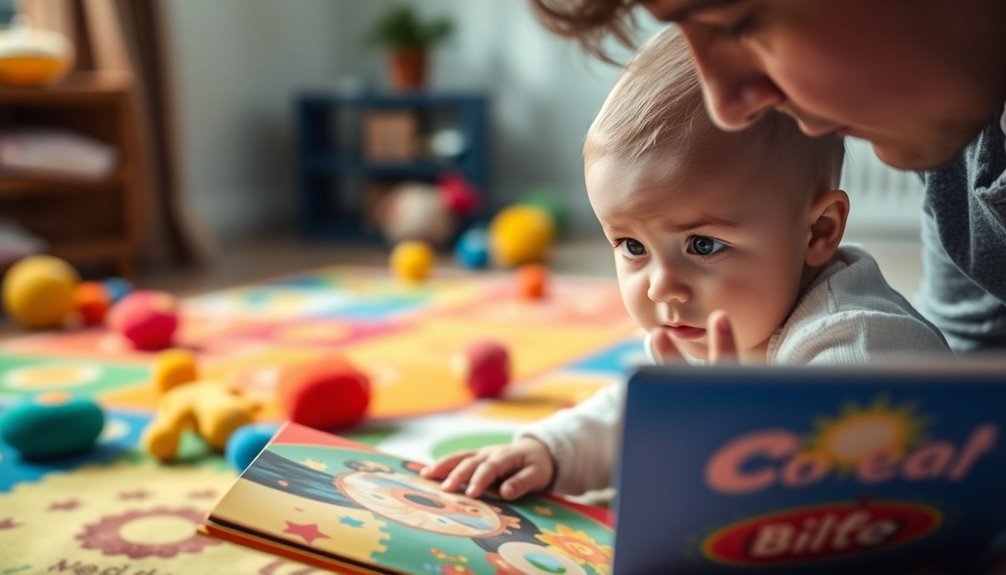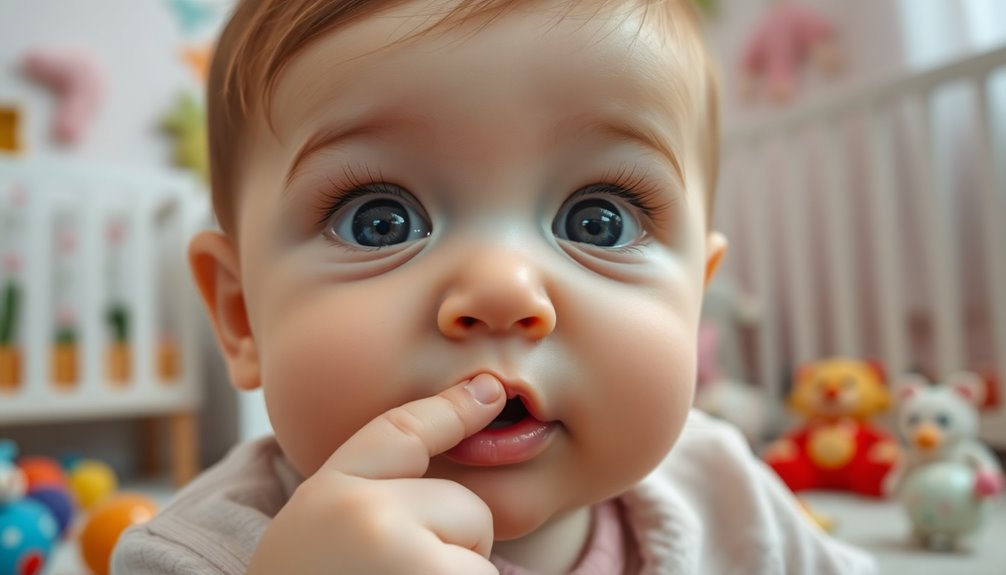You might be surprised to learn that babies typically start babbling between 4 to 6 months! First words usually come around their first birthday, between 9 and 12 months. Early speech milestones like cooing and babbling are essential for their development. By 18 months, toddlers often have around 50-100 words and can form simple phrases. If you're curious about how to support your baby's speech journey or signs of potential speech issues, keep exploring!
Key Takeaways
- Babies typically start speaking their first words between 9 to 12 months of age.
- By 18 months, toddlers usually have a vocabulary of 50-100 words.
- Consultation is recommended if no words are spoken by 15 months.
- At 24 months, toddlers can form two to three-word phrases and exceed 100 words.
- Early intervention is crucial if developmental signs are concerning, such as lack of babbling by 6 months.
When Do Babies Start Babbling?

When do babies start babbling? Typically, babies start babbling around 4 to 6 months of age. During this time, they produce repetitive consonant-vowel combinations like "muh-muh" and "bah-bah."
Babbling is an essential part of speech development, allowing your baby to practice sounds and explore vocal capabilities. By 6 months, if you notice a lack of vocal sounds, it might be worth discussing with your pediatrician, as it could indicate developmental concerns.
As your baby approaches 9 months, you'll likely see them combining sounds into more complex syllable structures. This babbling phase is vital for communication, as it lays the groundwork for their emerging language skills and the important developmental milestones ahead.
When Do Babies Start Talking?

Babies start talking around their first birthday, with many uttering their first word between 9 and 12 months. This is when you'll notice significant speech milestones in your baby's language development.
Early on, they'll begin with cooing sounds and babbling, practicing sounds like "muh-muh" and "bah-bah." By 18 months, your toddler might've a vocabulary of 50-100 words and can start using simple two-word phrases.
In the early stages, babies coo and babble, eventually expanding their vocabulary to 50-100 words by 18 months.
As they approach 24 months, expect them to form phrases of two to three words and possibly exceed a vocabulary of 100 words.
However, if your baby hasn't spoken any words by 15 months, it's wise to consult a pediatrician for potential speech delays to guarantee proper support.
How to Teach Baby to Talk

Teaching your baby to talk can be a delightful journey, and there are several effective strategies to encourage their language development. Engage in frequent face-to-face interactions to foster a rich language environment. Practice clear enunciation, helping them learn sounds and word formations. Introduce baby sign language for key words to enhance early communication and reduce frustration. Narrate daily activities and describe objects, building their vocabulary. Respond to your baby's coos and babbles to encourage imitation and participation.
| Strategy | Description |
|---|---|
| Face-to-Face Interaction | Boosts engagement and communication skills |
| Clear Enunciation | Helps with correct sound and word formation |
| Baby Sign Language | Provides early communication tools |
| Daily Narration | Associates words with objects and activities |
| Responding to Sounds | Encourages imitation and reinforces language growth |
What to Do If Baby Isn't Talking

Noticing that your child isn't talking can be concerning, especially when developmental milestones indicate they should be. If your baby hasn't started babbling by six months, it's wise to consult a pediatrician.
By nine months, if they don't respond to their name, that could be a sign of hearing or developmental issues.
By 15 months, if no words are spoken, seeking professional guidance is vital, as this may indicate a speech delay.
At 24 months, having fewer than 25 words in their vocabulary warrants a specialist's assessment.
Keep an eye out for signs like the inability to imitate sounds or follow simple directions by 18 months, as early intervention can greatly enhance your child's communication development.
Factors Affecting Speech Development

When a child isn't talking as expected, it's important to contemplate various factors that can influence their speech development. These include environmental factors, the role of caregivers, and the level of verbal interactions a child experiences. Early exposure to language through reading and conversation greatly boosts language acquisition and communication skills. Additionally, establishing a bedtime routine can create a supportive environment conducive to healthy development.
| Factor | Impact on Speech Development |
|---|---|
| Medical Issues | Can delay language development |
| Caregiver Interaction | Encourages speech milestones |
| Siblings' Presence | Influences verbal interactions |
| Bilingual Exposure | Expands vocabulary across languages |
| Face-to-Face Engagement | Enhances communication skills |
Understanding these factors is essential for supporting your child's growth in language and communication during critical stages of child development.
Signs of Potential Speech Issues

Identifying signs of potential speech issues early on can make a significant difference in a child's development.
If your baby isn't making vocal sounds by 6 months or doesn't respond to their name by 9 months, these are red flags indicating possible communication concerns.
By 15 months, if there are no first words, it's essential to seek a professional evaluation for delayed speech.
At 18 months, your child should be able to imitate sounds; failure to do so may suggest speech development delays.
Finally, if they aren't using two-word combinations by age 2, consulting a pediatrician for further assessment is advisable.
Early intervention can greatly enhance your child's speech skills and overall communication abilities.
Frequently Asked Questions
What Age Do Babies Start Fully Talking?
Babies typically start fully talking around 24 months. By this age, they can use short sentences and boast a vocabulary of 100 words or more.
You'll notice them combining words into simple phrases and expressing their needs more clearly.
However, it's important to keep an eye on their speech development. If your child isn't using recognizable words by 15 months or forming sentences by 2, consider seeking professional evaluation.
At What Age Should a Baby Know How Do You Talk?
Imagine a garden blossoming with words. By around 12 months, your baby might start to pluck their first verbal blooms, often saying simple words.
By 18 months, you'll see a vocabulary of 10-50 words sprouting. As they reach 24 months, those words begin to twist together into phrases, like vines intertwining.
If you don't hear any words by 15 months, it's wise to chat with a pediatrician for guidance on their speech journey.
Can a Baby Say Mama at 6 Months?
At 6 months, your baby might babble sounds like "mama," but it's usually not a directed word.
While some infants vocalize "mama" at this age, they typically don't associate it with you. Their vocal skills are developing, but meaningful speech usually starts around 9 to 12 months.
You can encourage this progress by talking to your baby often, helping them shift from simple sounds to recognizable words over time.
Is It Normal for a 2 Year Old Not to Talk?
It's concerning if your 2-year-old isn't talking yet. By this age, most kids should have about 50 words and start using two-word phrases.
If your child isn't using any words by 15 months, it's wise to consult a pediatrician.
Remember, environmental factors play a role too; more interaction can boost their speech development.
If you notice delays in meeting milestones, seeking professional advice is essential for your child's growth.
Conclusion
In the delightful journey of watching your little one grow, speech development is a fascinating milestone. While every baby blossoms at their own pace, don't fret if things seem a bit quiet. Embrace the joyful babbles and playful coos, and remember that you're not alone in this adventure. With a sprinkle of encouragement and patience, you'll soon hear those first precious words. So, keep the faith, and before you know it, their chatter will fill your world with joy!









